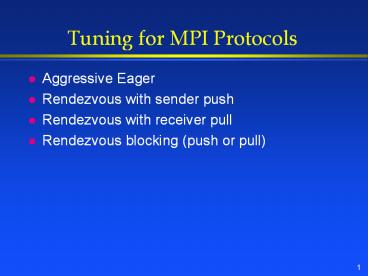Tuning for MPI Protocols - PowerPoint PPT Presentation
Title:
Tuning for MPI Protocols
Description:
Manually advance automaton. Persistent operations. 16 ... Manually Advance Automaton. irecv, isend, iprobe in computation, waitall. To test for messages: ... – PowerPoint PPT presentation
Number of Views:18
Avg rating:3.0/5.0
Title: Tuning for MPI Protocols
1
Tuning for MPI Protocols
- Aggressive Eager
- Rendezvous with sender push
- Rendezvous with receiver pull
- Rendezvous blocking (push or pull)
2
Aggressive Eager
- Performance problem extra copies
- Possible deadlock for inadequate eager buffering
3
Tuning for Aggressive Eager
- Ensure that receives are posted before sends
- MPI_Issend can be used to express wait until
receive is posted
4
Rendezvous with Sender Push
- Extra latency
- Possible delays while waiting for sender to begin
5
Rendezvous Blocking
- What happens once sender and receiver rendezvous?
- Sender (push) or receiver (pull) may complete
operation - May block other operations while completing
- Performance tradeoff
- If operation does not block (by checking for
other requests), it adds latency or reduces
bandwidth. - Can reduce performance if a receiver, having
acknowledged a send, must wait for the sender to
complete a separate operation that it has started.
6
Tuning for Rendezvous with Sender Push
- Ensure receives posted before sends
- better, ensure receives match sends before
computation starts may be better to do sends
before receives - Ensure that sends have time to start transfers
- Can use short control messages
- Beware of the cost of extra messages
7
Rendezvous with Receiver Pull
- Possible delays while waiting for receiver to
begin
8
Tuning for Rendezvous with Receiver Pull
- Place MPI_Isends before receives
- Use short control messages to ensure matches
- Beware of the cost of extra messages
9
Experiments with MPI Implementations
- Multiparty data exchange
- Jacobi iteration in 2 dimensions
- Model for PDEs, Matrix-vector products
- Algorithms with surface/volume behavior
- Issues similar to unstructured grid problems (but
harder to illustrate) - Others at http//www.mcs.anl.gov/mpi/tutorials/per
f
10
Multiparty Data Exchange
- Real programs have many processes exchanging
data, often nearly at the same time - Pingpong tests do not measure this communication
pattern - Simultaneous pingpong between processes i and
ip/2 on IBM SP2
11
Scheduling for Contention
- Many programs alternate between communication and
computation phases - Contention can reduce effective bandwidth
- Consider restructuring program so that some nodes
communicate while others compute
0
1
2
3
12
Jacobi Iteration
- Simple parallel data structure
- Processes exchange rows with neighbors
13
Background to Tests
- Goals
- Identify better performing idioms for the same
communication operation - Understand these by understanding the underlying
MPI process - Provide a starting point for evaluating
additional options (there are many ways to write
even simple codes)
14
Different Send/Receive Modes
- MPI provides many different ways to perform a
send/recv - Choose different ways to manage buffering (avoid
copying) and synchronization - Interaction with polling and interrupt modes
15
Some Send/Receive Approaches
- Based on operation hypothesis. Most of these are
for polling mode. Each of the following is a
hypothesis that the experiments test - Better to start receives first
- Ensure recvs posted before sends
- Ordered (no overlap)
- Nonblocking operations, overlap effective
- Use of Ssend, Rsend versions (EPCC/T3D can prefer
Ssend over Send uses Send for buffered send) - Manually advance automaton
- Persistent operations
16
Scheduling Communications
- Is it better to use MPI_Waitall or to
schedule/order the requests? - Does the implementation complete a Waitall in any
order or does it prefer requests as ordered in
the array of requests? - In principle, it should always be best to let MPI
schedule the operations. In practice, it may be
better to order either the short or long messages
first, depending on how data is transferred.
17
Some Example Results
- Summarize some different approaches
- More details at http//www.mcs.anl.gov/mpi/tutoria
l/perf/ mpiexmpl/src3/runs.html
18
Send and Recv
- Simplest use of send and recv
- Very poor performance on SP2
- Rendezvous sequentializes sends/receives
- OK performance on T3D (implementation tends to
buffer operations)
19
Better to start receives first
- Irecv, Isend, Waitall
- Ok performance
20
Ensure recvs posted before sends
- Irecv, Sendrecv/Barrier, Rsend, Waitall
21
Receives posted before sends
- Best performer on SP2
- Fails to run on SGI (needs cancel) and T3D (core
dumps)
22
Ordered (no overlap)
- Send, Recv or Recv, Send
- MPI_Sendrecv (shift)
- MPI_Sendrecv (exchange)
23
Shift with MPI_Sendrecv
- Performs reasonably well simpler than many other
approaches - T3D performance is ok but other approaches are
better
24
Use of Ssend versions
- Ssend allows send to wait until receive ready
- At least one implementation (T3D) gives better
performance for Ssend than for Send
25
Nonblocking Operations, Overlap Effective
- Isend, Irecv, Waitall
- A variant uses Waitsome with computation
26
Persistent Operations
- Potential saving
- Allocation of MPI_Request
- Validating and storing arguments
- Variations of example
- sendinit, recvinit, startall, waitall
- startall(recvs), sendrecv/barrier,
startall(rsends), waitall - Some vendor implementations are buggy
- Persistent operations may be slightly slower
27
Manually Advance Automaton
- irecv, isend, iprobe in computation, waitall
- To test for messagesMPI_Iprobe( MPI_ANY_SOURCE,
0, MPI_COMM_WORLD, flag, status )
28
Summary of Results
- Better to start sends before receives
- Most implementations use rendezvous protocols for
long messages (Cray, IBM, SGI) - Synchronous sends better on T3D
- otherwise system buffers
- MPI_Rsend can offer some performance gain on SP2
- as long as receives can be guaranteed without
extra messages































